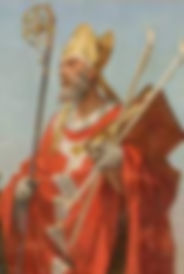The Catholic Defender: Saint Blaise "saint of the wild beast."
- Donald Hartley
- 2 hours ago
- 4 min read

Faith is a sheer gift of God, which we receive when we fervently ask for it. Faith is the supernatural power that is absolutely necessary if we are to attain salvation.
Though we do not always honor God as we should, in His unbounded generosity, For God so loved the world, that he gave his only Son, that whoever believes in him should not perish but have eternal life.
We know more about the devotion to Saint Blaise by Christians around the world than we know about the saint himself. His feast is observed as a holy day in some Eastern Churches. In 1222, the Council of Oxford prohibited servile labor in England on Blaise’s feast day. The Germans and Slavs hold him in special honor, and for decades many United States Catholics have sought the annual Saint Blaise blessing for their throats.
We know that Bishop Blaise was martyred in his episcopal city of Sebastea, Armenia, in 316. The legendary Acts of St. Blaise were written 400 years later. According to them Blaise was a good bishop, working hard to encourage the spiritual and physical health of his people. Although the Edict of Toleration (311), granting freedom of worship in the Roman Empire, was already five years old, persecution still raged in Armenia.
From being a healer of bodily ailments, Saint Blaise became an expert of souls, then retired for a time to a cavern where he remained in prayer.

Blaise was of noble birth and, after being educated in the Christian faith, was made bishop of Sebastia. Although Christianity had been adopted about 300 BC as the state religion in Armenia, the Roman emperor Licinius began a persecution of the Christians, and Blaise was discovered and apprehended. While imprisoned, he miraculously cured a boy from fatally choking. After being torn with wool combers’ irons, Blaise was beheaded.
He is said to have healed animals (who came to the saint on their own for his assistance) and to have been assisted by animals.
He received a message from God to escape to the hills in order to avoid persecution. He came upon a cave that was surrounded by sick animals. He was able to cure them of their illness. The men who were hunting in this area recognized him as a bishop where he was brought before the governor and killed.
Blaise was apparently forced to flee to the back country. There he lived as a hermit in solitude and prayer, but he made friends with the wild animals. One day a group of hunters seeking wild animals for the amphitheater stumbled upon Blaise’s cave. They were first surprised and then frightened. The bishop was kneeling in prayer surrounded by patiently waiting wolves, lions and bears.

Blaise instructed his people as much by his example as by his words, and the great virtues and sanctity of the servant of God were attested by many miracles.
St.Blaise saved the life of a boy who had a fishbone stuck in his throat by ordering the child to cough it up. That is how the tradition of St. Blaise throat blessings began.
Agricolaus, governor of Cappadocia, tried to persuade Blaise to sacrifice to pagan idols. The first time Blaise refused, he was beaten. The next time he was suspended from a tree and his flesh torn with iron combs or rakes. Finally, he was beheaded.
In prison, Saint Blaise was ordered to renounce his faith. He refused so was beaten with wool combs and beheaded. After his death, he was made a saint and has become the patron saint of wool combers, wild animals, candle makers and ailments of the throat.
While on Blaise’s way to jail, the legend continues that a boy was choking on a fishbone, and the boy’s mother sent her son to Blaise for his prayers. Bishop Blaise miraculously cured him on the spot.
Another story relates that on that journey to jail, a woman begged him to save her pig who had been seized by a wolf. Bishop Blaise ordered the wolf to release the pig and the wolf obeyed. Out of gratitude, the woman brought Blaise two wax candles to give light to his prison cell.

For a time Blaise lived in a cave to escape persecution. On his feast the Church recalls a miracle cure associated with him and celebrates the blessing of the throats with candles.
When he reached Sebastea, the woman came to him and brought two fine wax candles in an attempt to dispel the gloom of his darkened cell.
Saint Blaise is often depicted holding two crossed candles in his hand, or in a cave with wild animals. He is also often shown with steel combs. The similarity of the steel combs and the wool combs made a large contribution to Saint Blaise's leadership as the patron saint of wool combers and the wool trade.
Every year around this time we are invited to the altar to have our throats blessed. The priest or deacon says: “Through the intercession of St. Blaise, bishop and martyr, may God deliver you from every disease of the throat and from every other illness, in the name of the Father and of the Son and of the Holy Spirit.”

The two candles are held up and crossed over the throats and the blessing is given: "May Almighty God at the intercession of St. Blaise, Bishop and Martyr, preserve you from infections of the throat and from all other afflictions".
Saint Blaise, you accepted the will of God as it was expressed through the acclamation of the people to become their shepherd. You lovingly spread the faith, healed the sick, and laid down your life as a martyr. Please pray for me and my family that we may be kept safe from all illness, especially illnesses of the throat, and pray that I will have the same courage you had to be a witness to Christ, even to the point of death. Saint Blaise, pray for me. Jesus, I trust in You.
Died c. 316
Patron Saint of illnesses of the throat and other illnesses, wool workers, animals, bricklayers, bakers, farm workers
Pre-Congregation canonization
Liturgical Color: Red








